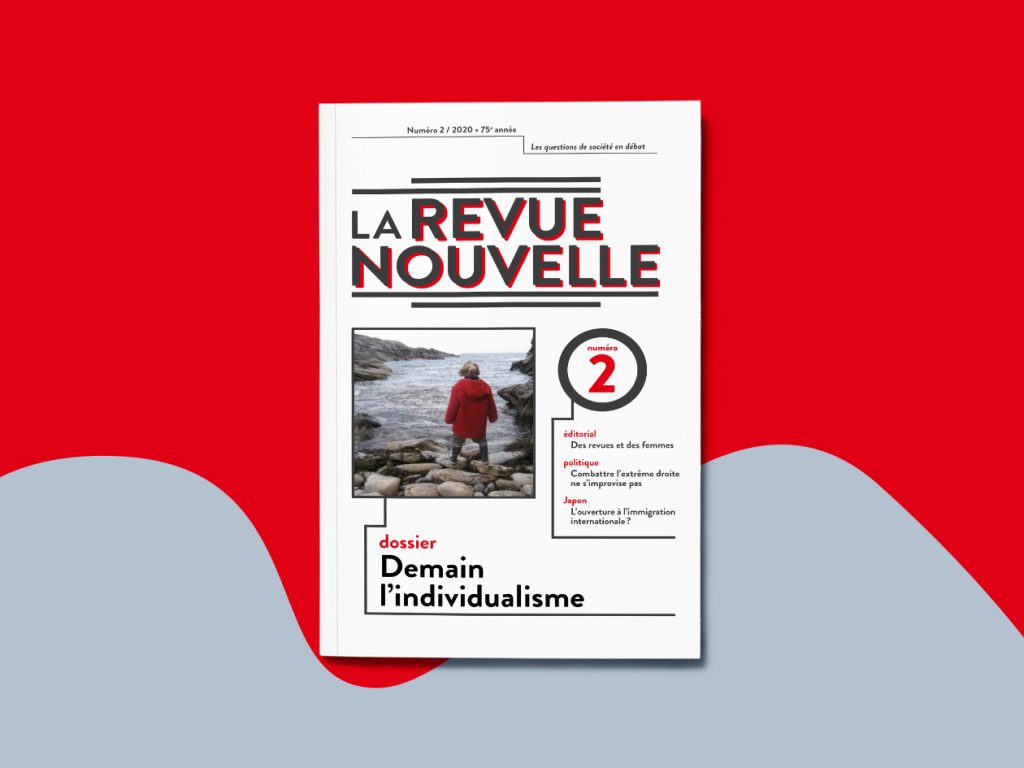Belgian journal ‘La Revue nouvelle’ reflects on individualism and criticisms made of it. Why collective behaviour is by no means absent in contemporary society; what burnout tells us about social change; and whether individualism is necessary for creativity.
 Challenging the orthodoxy that individualism is atomizing and egocentric, Vincent de Coorebyter asks in La Revue nouvelle why sociable and collective behaviours are by no means absent in contemporary society. Drawing on sociologist Paul Yonnet’s work on the effects of longer life expectancy and childrearing, de Coorebyter presents an alternative reading of individualism. It counsels us ‘not to despair of any capacity for engagement, including political engagement’, while also warning us ‘not to hope for some return to the past’.
Challenging the orthodoxy that individualism is atomizing and egocentric, Vincent de Coorebyter asks in La Revue nouvelle why sociable and collective behaviours are by no means absent in contemporary society. Drawing on sociologist Paul Yonnet’s work on the effects of longer life expectancy and childrearing, de Coorebyter presents an alternative reading of individualism. It counsels us ‘not to despair of any capacity for engagement, including political engagement’, while also warning us ‘not to hope for some return to the past’.
Burnout: Thomas Lemaigre explores the growing prevalence of burnout, examining the origins of the notion, the exact nature of the syndrome, and the treatments that have been proposed for it. What does this contemporary pathology reveal about social change, in particular the shift toward greater individualism? The fact that those most commonly affected by burnout are individuals with high emotional investment in their work indicates a link with the growing emphasis on autonomy and professional satisfaction — ‘something like an illness of subjective engagement’.
Creativity: In conversation with native and exiled artists in Brussels, Malika Es-Saïdi asks whether ‘individualist’ is a positive or a negative term for an artist — and whether a ‘deficit of individualism’ stifles creativity. Guillermo Kozlowski reflects on the contradictory messages that we receive about individualism and how we came to think of ourselves as individuals in the first place.
Feminist history: Each phase in the history of feminist thought has been associated with the militant appropriation of particular media, writes editor Laurence Rosier, recalling La Revue nouvelle’s own contribution to the struggle (the journal was founded in 1945). Martine Monacelli salutes a lineage of male thinkers, including Robert Owen and John Stuart Mill, whose writings played a significant role in the advance of the feminist cause — proving that ‘nineteenth-century feminism was, far more than we might imagine, the result of a collaboration between the sexes, itself heir to a well-established tradition.’
Also: Mohammed Chourak on the exceptional case of Japan, forced to negotiate a difficult path between demographic decline and resistance to foreign labour.
More articles from La Revue nouvelle in Eurozine; La Revue nouvelle’s website
This article is part of the 6/2020 Eurozine review. Click here to subscribe to our weekly newsletter, to get updates on reviews and our latest publishing.

This article was published in cooperation with CAIRN International Edition, translated and edited by Cadenza Academic Translations.
Published 9 April 2020
Original in English
Contributed by La Revue nouvelle © Eurozine
PDF/PRINTPublished in
In collaboration with
Newsletter
Subscribe to know what’s worth thinking about.
Related Articles

Being diagnosed with ADHD can be a relief for those who have struggled long and hard to adopt constraining social norms. For neurodivergent women, masking can lead to poor mental health, substance abuse and hyper-sexuality. Vox Feminae takes a first-hand dive into positive coping mechanisms for the inattentive and/or hyperactive.

Second-wave feminist concerns over violence to women led to intense disagreement over pornography. For some, sexually explicit content was inherently abusive. Others explored the potential of what became sex positivity. Vox Feminae charts the emergence of US lesbian BDSM magazines from the late 1970s.










